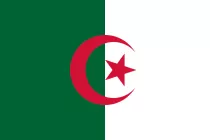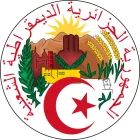Algeria

Geographical Location of Algeria
Algeria is the largest country in Africa by area and is located on the northern coast of the continent near the Mediterranean Sea. The Sahara Desert in the south covers more than 80 percent of the country. The Atlas Mountains separate the Mediterranean coast from the hot and dry Sahara Desert. The coastal area has a Mediterranean climate and many hills and mountains. In mountainous areas, winters can be very cold. The Tell region between the coast and the desert is fertile but small, and contains almost all of Algeria's arable land.
Algeria is highly prone to droughts and water shortages, and pollution is a serious problem. Overgrazing and other inefficient agricultural practices lead to soil erosion and the spread of desert. To prevent the spread of desertification, authorities began planting a “green dam” of trees in 1975. The Mediterranean is particularly susceptible to pollution from soil erosion, overuse of fertilizers and oil waste.
Brief History of Algeria
The earliest traces of human activity in Algeria can be traced back to approximately 1.8 million years ago. The Berbers are considered the indigenous population of Algeria and were the result of several immigrations during the Stone Age.
Algeria's history has been turbulent, with repeated conquests and fierce resistance. Algeria's location on the Mediterranean Sea made the country a good trade route between Europe, Africa and the Middle East. The location has led to the area being inhabited by several different groups of people throughout history. Among them are the Phoenicians, Romans, Vandals and Byzantines.
The Romans controlled Algeria for several centuries. They captured most of the Berber territory and brought Christianity to the people. In the middle of the 6th century, the Arab conquest of North-West Africa began. Various Arab dynasties controlled the area until the Ottoman Empire took control in 1516. Under the Ottoman Empire, Algeria was an autonomous region.
Home rule ended when France invaded and colonized the country in 1830. During the War of Resistance against the French, a third of the population died both on the battlefield, from disease and starvation. At the same time, the French moved into Algeria and seized the lands of the existing population. The local Muslim population fought against colonial rule for several decades. Discontent and the growing liberation movement led to the outbreak of the Algerian War of Liberation in 1954. The war is estimated to have claimed up to 1.5 million lives and is considered Africa's bloodiest war of liberation. Eight years later, France and Algeria signed a truce, and Algeria became independent in 1962.
After liberation, Algeria became a one-party state. The country depended on oil revenues, and falling oil prices led to difficult economic times. The high cost of living, poor job opportunities and government corruption led to a national uprising. During the 1991 parliamentary elections, a new Islamist party was close to taking power. The government feared they would lose power and therefore canceled the elections. This led to the outbreak of civil war in the country. When the bloody civil war ended in 2002, more than 150,000 people had died.
Society and Politics of Algeria
Algeria is a republic with a strong presidential government. The President is the head of state and head of the armed forces. The President also appoints the Prime Minister. The president is elected every five years and can only serve two terms following a constitutional amendment in 2021. Parliament has legislative power.
According to the constitution, Algeria is a democratic country with a multi-party system, but in reality, since liberation in 1962, politics has been dominated by an elite consisting of the military and the ruling party. The political situation in the country is unstable - international observers criticize the elections for fraud, the authorities are accused of corruption, protests are met with military force. In 2019, the incumbent president resigned amid large protests after 20 years in power. A new president was then elected, but critics of the regime said this could not be considered a real change of power.
During the Arab Spring of 2011, demonstrations broke out in Algeria. This led to the lifting of the national emergency imposed at the beginning of the civil war.
Economy and Trade of Algeria
Oil was discovered in the Sahara Desert in the late 1950s, and today it is Algeria's most important export. It accounts for nearly 95 percent of the country's exports and 30 percent of the country's gross domestic product. State oil company Sonatrach is Africa's largest company. Foreign oil companies are very interested in Algeria's oil resources, which are estimated at more than 12 billion barrels. Algeria exports mainly to Italy, Spain and France.
Besides oil and gas, mining and manufacturing are central parts of the economy. Algeria has large mineral resources, especially iron and zinc. Agriculture was an important part of Algeria's economy until the 1950s, when the country produced enough food for export. Today, the agricultural sector is underdeveloped and Algeria depends on food imports to supply its population.
Although regular discoveries of oil and gas have strengthened the economy, oil dependence leaves the economy vulnerable. External conditions, such as falling oil prices, can have serious consequences for a country's economy. Poverty remains a major problem in the country, with more than a fifth of the population living below the national poverty line. Unemployment is high, especially among young people. Widespread corruption and low standards of public services also lead to discontent among the population.







